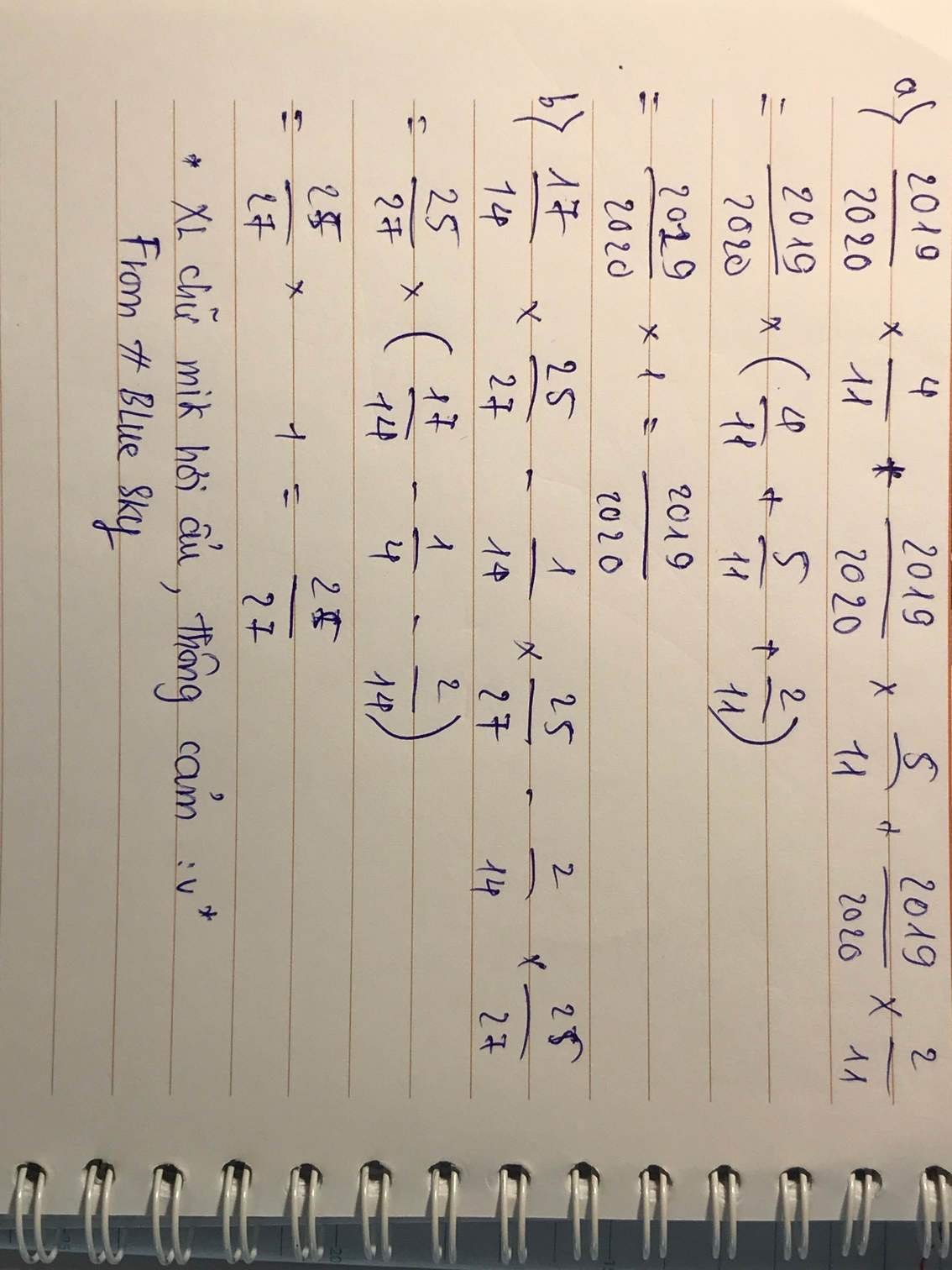A = (-1)1 x (-1)2 x (-1)3 x (-1)4 x...x (-1)2019 x (-1)2020
Hãy nhập câu hỏi của bạn vào đây, nếu là tài khoản VIP, bạn sẽ được ưu tiên trả lời.


\(\dfrac{1}{\left(x+1\right)\left(x+2\right)}+\dfrac{1}{\left(x+2\right)\left(x+3\right)}+\dfrac{1}{\left(x+3\right)\left(x+4\right)}=\dfrac{2019}{2020}\)
\(\Leftrightarrow\dfrac{1}{x+1}-\dfrac{1}{x+2}+\dfrac{1}{x+2}-\dfrac{1}{x+3}+\dfrac{1}{x+3}-\dfrac{1}{x+4}=\dfrac{2019}{2020}\)
\(\Leftrightarrow\dfrac{1}{x+1}-\dfrac{1}{x+4}=\dfrac{2019}{2020}\)
\(\Leftrightarrow\dfrac{x+4-x-1}{\left(x+1\right)\left(x+4\right)}=\dfrac{2019}{2020}\)
\(\Leftrightarrow\dfrac{3}{\left(x+1\right)\left(x+4\right)}=\dfrac{2019}{2020}\)
\(\Leftrightarrow\left(x+1\right)\left(x+4\right).2019=6060\)
<=> x = - 0,208387929
P/s: Số lạ zậy?Đề sai ko

\(A=\left(2020\times2019+2019\times2018\right)\times\left(1+\dfrac{1}{2}:1\dfrac{1}{2}-1\dfrac{1}{3}\right)\)
\(A=\left[2019\times\left(2020+2018\right)\right]\times\left(1+\dfrac{1}{2}:\dfrac{3}{2}-\dfrac{4}{3}\right)\)
\(A=4038\times2019\times\left(1+\dfrac{1}{3}-\dfrac{4}{3}\right)\)
\(A=4038\times2019\times0\)
\(A=0\)

a) (x - 1)3 - 1 = 0
<=> (x - 1)3 = 0 + 1
<=> (x - 1)3 = 1
<=> (x - 1)3 = 13
<=> x - 1 = 1
<=> x = 1 + 1
<=> x = 2
=> x = 2
b) (x - 4)2019 = 1
<=> (x - 4)2019 = 12019
<=> x - 4 = 1
<=> x = 1 + 4
<=> x = 5
=> x = 5
c) (x - 2019)2020 = 0
<=> (x - 2019)2020 = 02020
<=> x - 2019 = 0
<=> x = 0 + 2019
<=> x = 2019
=> x = 2019
d) (x - 1)2 = (x - 1)3
<=> x2 - 2x + 1 = x3 - 2x2 + x - x2 + 2x - 1
<=> x2 - 2x + 1 = x3 - 3x2 + 3 - 1
<=> x2 - 2x + 1 - x3 + 3x2 - 3 + 1 = 0
<=> 4x2 - 5x + 2 - x3 = 0
<=> (-x2 + 3x - 2)(x - 1) = 0
<=> (x2 - 3x + 2)(x - 1) = 0
<=> (x - 2)(x - 1)(x - 1) = 0
<=> x - 2 = 0 hoặc x - 1 = 0
x = 0 + 2 x = 0 + 1
x = 2 x = 1
=> x = 1 hoặc x = 2

\(a.=\dfrac{2019}{2020}\times\left(\dfrac{4}{11}+\dfrac{5}{11}+\dfrac{2}{11}\right)\\ =\dfrac{2019}{2020}\times1=\dfrac{2019}{2020}\\ b.=\dfrac{25}{27}\times\left(\dfrac{17}{14}-\dfrac{1}{14}-\dfrac{2}{14}\right)\\ =\dfrac{25}{27}\times1=\dfrac{25}{27}\)

Dễ thấy A chia hết cho 10 nên A có tận cùng là 0
còn 1x 3 x 5 x... x 2021 là một số lẻ và chia hết cho 5 nên có tận cùng là 5

Cho a,b,c khác 0 t/m:
1/a+1/b+1/c=1/2018 và a+b+c=2018
cmr" 1/a^2019+1/b^2019+1/c^2019=1/(a^2019+b^2019+c^2019)
Ta có :
gt⇒x2−xy−(5x−5y)−x+8=0⇒(x−y)(x−5)−(x−5)=−3⇒(5−x)(x−y−1)=3gt⇒x2−xy−(5x−5y)−x+8=0⇒(x−y)(x−5)−(x−5)=−3⇒(5−x)(x−y−1)=3
Đến đây là dạng của phương trình ước số bạn chỉ cần xét ước của 33 là sẽ tìm được nghiệm nguyên của PT
